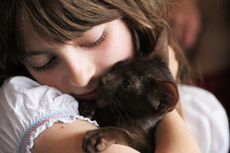

By Helen Anne Travis
Has Kitty been acting strange lately? Maybe she’s scratching or biting more than usual, or hiding when you call her name? Don’t take it personally. Any number of factors, from a big move to an underlying health condition, can bring about changes in your cat’s behavior. Here are the steps you can take to identify the cause of your pet’s “cattitude,” as well as tips for helping Kitty get back to her old self.
Cats are especially good at hiding it when they’re sick. In the wild, an animal that shows signs of weakness is an easy target for predators, so it can be a cat’s natural instinct that causes it to hide its underlying pain or health problem.
“Animals can’t tell us what’s wrong,” said Dr. Rachel Barrack of Animal Acupuncture in New York City. “With any behavioral changes it’s important to make sure there isn’t an underlying medical condition.”
That’s why it’s important to bring your pet to the veterinarian to ensure Kitty’s sudden aggression or reclusiveness isn’t a sign of an underlying medical issue. If a normally happy and friendly cat starts acting out or hiding from its owners, it could be a sign that something is seriously wrong, said Dr. Erick Mears, medical director at BluePearl Veterinary Partners.
Any number of health problems can bring about a change in behavior, Barrack said. A painful infection may make a sweet cat lash out at her owners, while a metabolic or kidney issue can cause her to miss her litter box or an arthritis flare up may send her hiding under the bed for days. Other medical issues that can bring about a change in behavior include hyperthyroidism, cancer and heart disease. Ingestion of foreign material such as strings or threads often produce intermittent but severe abdominal pain, and constipation is notorious for generating subtle behavioral issues such as hiding or inappetence. Male cats can also suffer from painful urinary blockages and a brain tumor can make your pet literally become a different animal.
If vomiting, diarrhea or changes in appetite accompany your cat’s behavioral changes, it’s especially important to bring your pet to the doctor as soon as possible, Mears said.
Cats aren’t big fans of change. Moving to a new home, being introduced to a new family member (furry or human) or even adjusting to a new schedule can stress a kitty out. Just like with people, it can take a pet time to adjust to new situations, and patience is key in these moments, Barrack said. Changes don’t have to be major to cause a problem. The sudden noise of a thunderstorm, fireworks or even a noisy houseguest can also make your cat more aggressive or reclusive than normal.
To help her out, give your cat a safe home base, a private spot where she has plenty of access to food, water and her litter box. If there are new people or pets in the house, make sure they can’t disturb Kitty’s space. If you just moved, set her up in a small room where she is surrounded by her favorite toys and familiar items.
Introduce her slowly to any new pet or human siblings, letting her return to her home base in between visits, and try to give her a sense of routine. If you usually feed her in the morning, bring the food to her home base after you wake up, and if you normally snuggle at bedtime, be sure to visit Kitty’s hiding space before hitting the hay. Your goal is to strike the perfect balance between letting her know you care and giving her the time and space she needs to adapt to the new situation (the amount of time it takes will vary from cat to cat).
Reward any signs of bravery with treats and encouragement, and don’t try to discipline her into acting like her old self.
“Cats in general don’t respond to punishment,” Mears said. “They don’t understand what’s going on.”
Lastly, even if you can trace the cat’s change in behavior directly to a change in its environment, it’s still prudent to rule out any health issues. A new pet in the house can expose your cat to disease and infections. If you just moved, there could be something in the new environment that is making it sick.
You may have heard stories about (or personally experienced) a cat urinating on its owners’ possessions if they go away for a long time. This might also occur when a new family member has been introduced to the household. This unwanted urination isn’t necessarily a sign of revenge, it could just be that your cat is bored.
“Animals that are left alone for long periods of time, or not given any mental stimulation, can become bored and thus destructive,” Barrack said.
If you’re traveling for long periods of time, consider hiring a pet sitter or, if you’re wrapped up in caring for a new infant, ask a cat-loving friend to come over and play with Kitty while you tend to her human sibling. If it’s a new kitty that’s hogging all the attention, make sure your longtime family friend is also getting plenty of loving.
If you have a kitten, you’re in luck. Playing with them often, handling them with care and exposing them to new people and situations may help your kitten grow into a more open adult. Just be sure you let the cat dictate what he or she is okay with, and don’t push them beyond their comfort zone.
If you’re dealing with an older kitty, your best bet is to treat her with kindness and reward any desired behaviors with treats and more love. Don’t force her to be another cat. Some are just less social than others.
“I think it’s important to treat cats as cats and not as little dogs,” Barrack said. “Cats tend to like to do things on their own terms.”
 How to Choose an Experienced Cat Breeder
Are you in search of a purebred cat? Picki
How to Choose an Experienced Cat Breeder
Are you in search of a purebred cat? Picki
 Obesity in Cats... and What to do About an Overweight Cat
Ever wonder what to do about your overweigh
Obesity in Cats... and What to do About an Overweight Cat
Ever wonder what to do about your overweigh
 Training Your Fearful Cat
Signs and Symptoms of Fear and Anxiety in Your
Training Your Fearful Cat
Signs and Symptoms of Fear and Anxiety in Your
 Cat Rubbing - Why Does My Cat Do That?
Cat Rubbing - Why Does My Cat Do That? Every cat owner has s
Cat Rubbing - Why Does My Cat Do That?
Cat Rubbing - Why Does My Cat Do That? Every cat owner has s
 Cats and Children - Keeping Both Safe
Cats and Children - Keeping Both Safe Cats and children make
Cats and Children - Keeping Both Safe
Cats and Children - Keeping Both Safe Cats and children make
Copyright © 2005-2016 Pet Information All Rights Reserved
Contact us: www162date@outlook.com